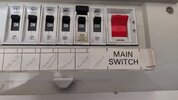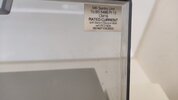- Joined
- 2 Dec 2023
- Messages
- 2
- Reaction score
- 0
- Country

Hi,
A electrician said I need a new CU to rent out the house as it requires 2 RCD's to pass the EICR. My friend who rents a house said that I don't. The house was built mid 90s, assuming it's the same unit. Pictures attached, any help would be appreciated.
Kind regards
Rash
A electrician said I need a new CU to rent out the house as it requires 2 RCD's to pass the EICR. My friend who rents a house said that I don't. The house was built mid 90s, assuming it's the same unit. Pictures attached, any help would be appreciated.
Kind regards
Rash


